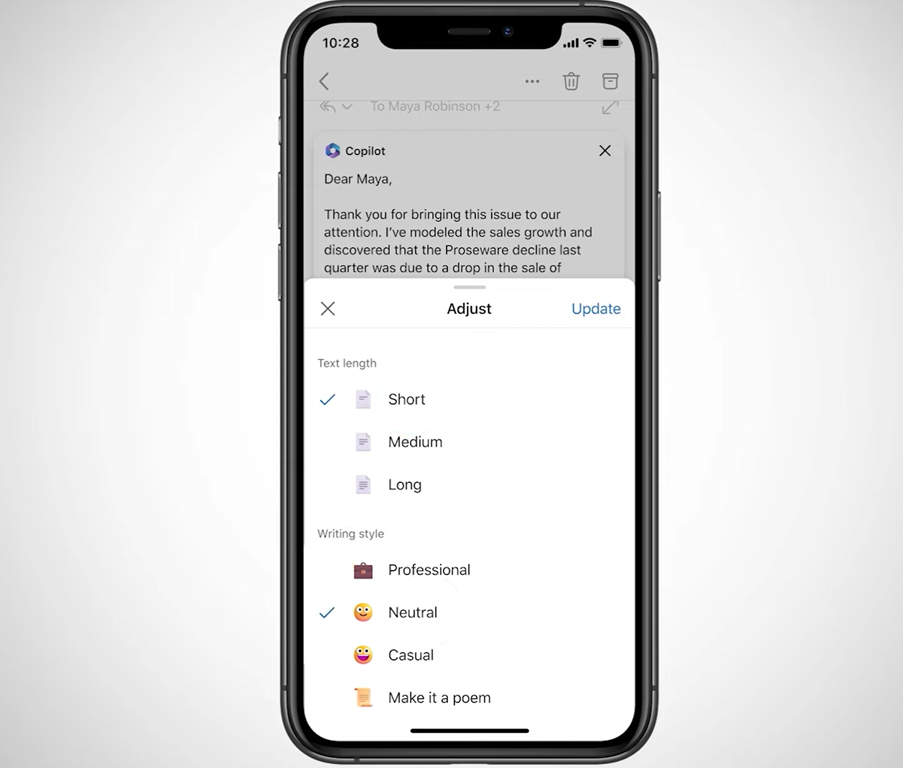Last year, we conducted a review of the pandemic’s lasting implications on flexible work and the rise of hybrid and remote work models. As we look at the most anticipated trends for 2024, it’s clear that generative AI will be taking centre stage.
AI has been one of the most rapid and revolutionary changes in recent years, underscoring the need for lifelong learning and future skills development. We also predict greater emphasis on data-driven decision-making and the widespread democratisation of data within organisations. In our 2024 Work Trends analysis, we examine how shifting workplace dynamics will impact people, processes and technology. By adapting to change, you can strategically position your business to stay ahead of the competition.
Impact of Generative AI
The emergence of ChatGPT led to the rapid rollout of similar AI products such as Microsoft Copilot – an AI-powered personal assistant seamlessly integrating with popular tools.
As we look towards the new year, investing in AI is set to become critical to reach your business goals. Gartner predicts that 90% of global companies will implement AI in their activities by 2025.
While exploring the capabilities of AI, the focus should be on enriching job roles while preserving employee creativity, innovation and empathy through a balanced approach of automation and human input.
The rise of generative AI extends across industries, emphasising the need for a transparent strategy driven by human-AI collaboration. Consider employee concerns about their job security and listen to their comfort levels when working with AI. We suggest you start by positioning AI as a tool they can control, for example using it to boost productivity, provide meeting and email recaps, and improve writing.
When creating a strategy, be cautious not to move too fast. The Qualtrics Employee Experience Trends study found only 37% of people are comfortable with AI involvement in performance appraisals. This suggests that employees may resist AI when it’s used in subjective tasks like job interviews and hiring decisions.
Hybrid Work Model Gaining Popularity
For most organisations, the office still has its place – 90% of employers are embracing a return to the office for at least part of the week. Full-time in-office work is linked to low levels of employee engagement but there are clear benefits to including some in-person office time. A hybrid work model is emerging as the most effective approach to create optimal working conditions, blending social collaboration with focused individual work.
Do you have the necessary digital tools in place to deliver a seamless, consistent experience across different work environments? This is where an intranet comes in. A modern intranet will not only improve communication and relationship-building but also make it easier for employees to complete work, leading to higher overall satisfaction.
Upskill for the Future
68% of HR leaders are prioritising critical skills and competencies development to meet evolving technological needs. Job requirements are constantly changing, meaning 6 in 10 workers will need training before 2027 to continue performing well.
It is quickly becoming a necessity to train your people in AI usage. Research revealed a 21x increase in the number of LinkedIn job postings specifically highlighting ChatGPT as a desirable requirement. Predicted in-demand skills include artificial intelligence, data utilisation, analytical thinking, technology literacy and crucial soft skills like communication and adapting to change.
Companies should proactively plan how to address this need and develop effective training programmes. Start evaluating the skills and knowledge gaps in your company, then integrate employee learning into daily work activities through platforms like Viva Learning. This enables you to create learning plans that align with key business goals and personal career development while targeting the right skills for the future.
Support Lifelong Learning
Companies play an important role in providing growth and lifelong learning opportunities. The 2023 LinkedIn Learning Report indicates a 25% change in core skillsets since 2015. This is expected to double by 2027.
Learning and development are top factors influencing employee retention. According to Gallup, 65% prefer companies that offer ongoing training opportunities. However, many companies are falling short of this expectation. Only 44% of executives provide the resources to facilitate skills development and accelerate career progression.
In 2024, it will be increasingly important to create a workplace culture that encourages engagement in learning, recognises and rewards achievements and personalises learning pathways.
Democratise Data
The workplace is increasingly driven by data insights, necessitating upskilling in areas like data literacy and informed decision-making. Organisations must provide the right tools to leverage the growing volume of data.
Microsoft offers several powerful applications to help you get the most value from your data. Power BI is a low-code, self-service tool for data interpretation, allowing employees to create visual dashboards and reports. Microsoft Fabric is a one-stop data analytic platform that enables efficient data utilisation.
We predict that democratising data beyond data professionals will become a top priority in 2024. Microsoft Dataverse – a cloud-based storage platform that integrates data from multiple sources – can make data more accessible to everyone.
How data is used will differentiate companies from their competitors. Businesses that empower all employees to understand and analyse data are already seeing an annual revenue increase of 5%. It has benefits such as removing the guesswork from strategic decisions, improving business agility and more.
Improve Employee Wellbeing
Work stress is at record high levels. ADP found that 67% of employees experience stress at least once a week and 53% believe it negatively impacts their performance.
There is a growing expectation for companies to go beyond performative wellbeing initiatives. Although 9 in 10 companies offer wellbeing benefits, health scores remain worryingly low. Most people say their wellbeing either worsened or stayed the same. Companies are already willing to improve engagement and wellbeing but the execution isn’t working.
Microsoft Viva is an employee experience platform that provides confidential people insights, equips managers with the tools they need to identify and act on a range of organisational issues. This enables you to focus your efforts on high-impact initiatives, backed by the latest trends and data.
Deloitte found that only 30% of managers model healthy habits. With Viva Insights you can use features like scheduled focus time, meditation breaks, virtual commutes and no-meeting days to promote better work-life balance. An intranet is also a great way to connect employees to each other and the wider company, fostering a sense of purpose and belonging and ensuring everyone is kept in the loop with internal communications.
We’ve collated the latest research on the continuing and emerging workplace trends shaping the workplace in 2024. Those who can quickly adapt to these changes and offer relevant training opportunities will be best positioned for success.
Be ready to take advantage of new opportunities, especially in generative AI, and plan workforce skills development to ensure you are ready for the future. As you explore new learning and wellbeing initiatives, it’s crucial to demonstrate commitment to meaningful change and invest in your employees.
Follow us on LinkedIn and YouTube for more insights like these. If you would like advice on your digital strategy or planned projects for the new year, you can book a meeting with one of our consultants.






